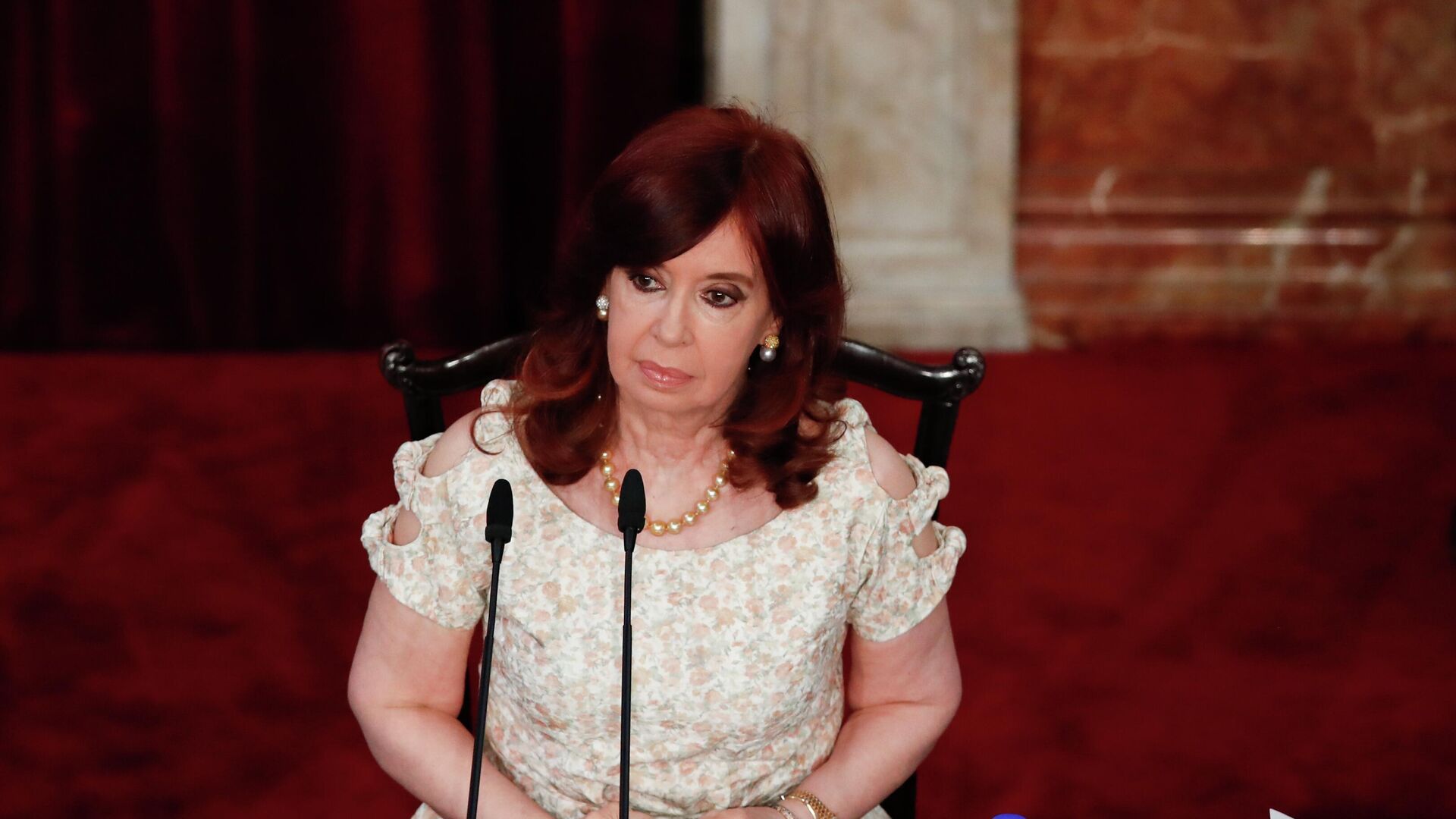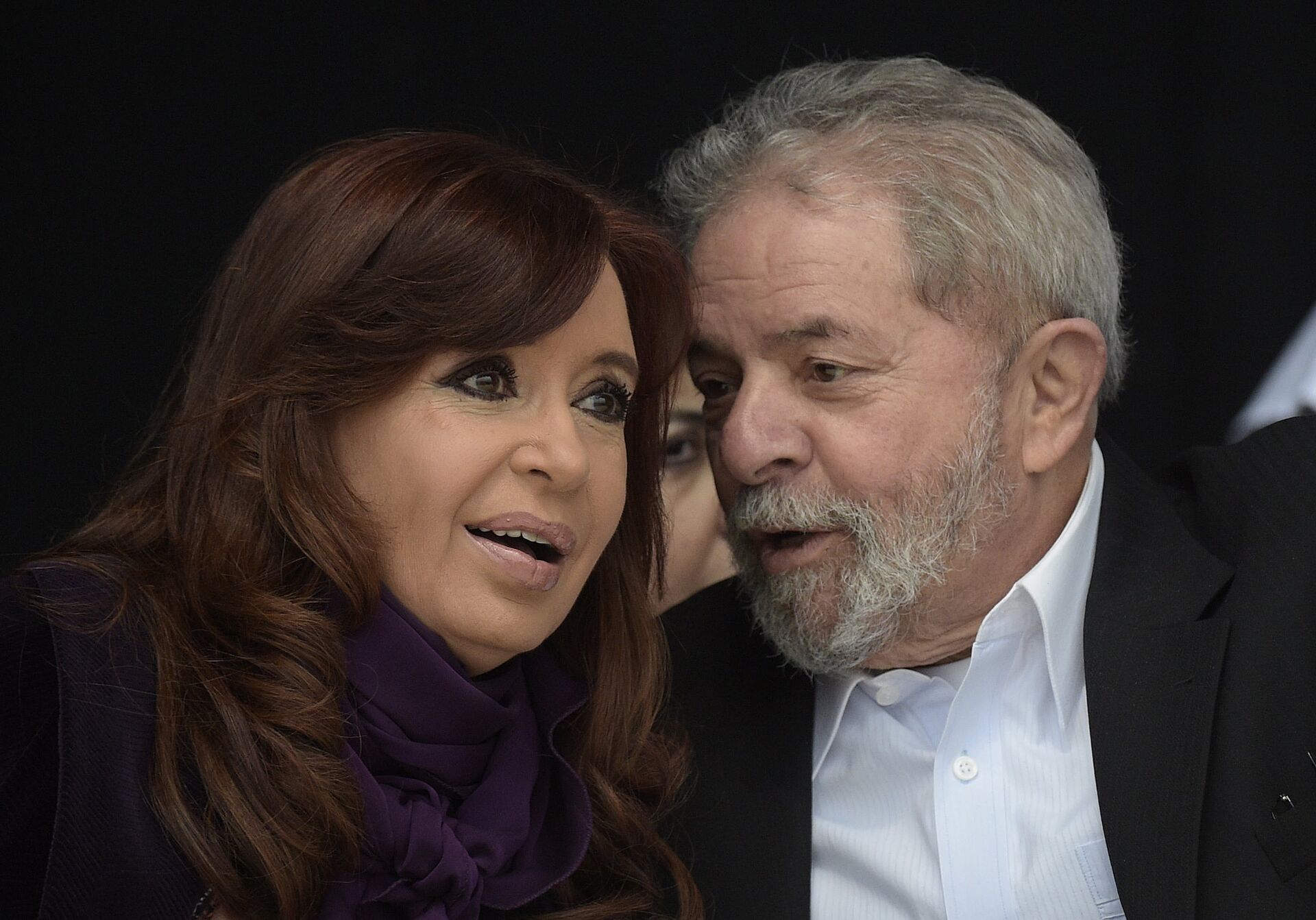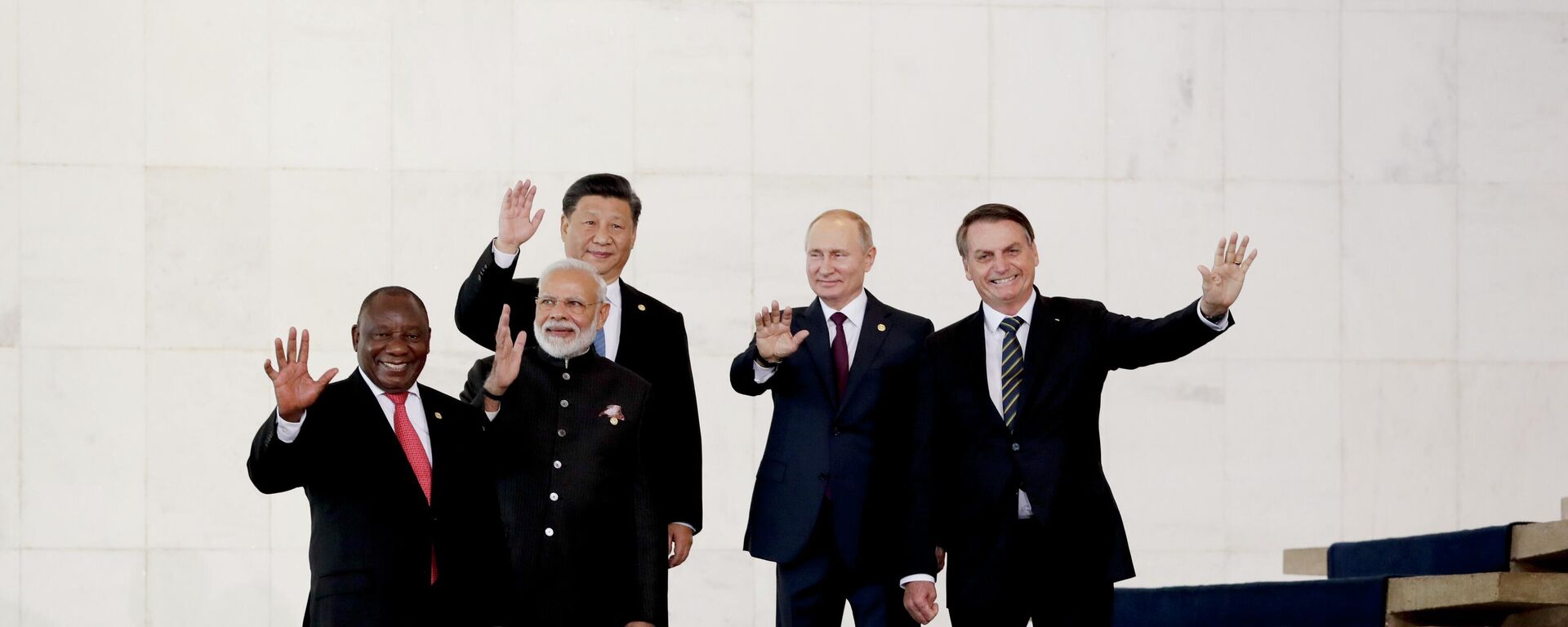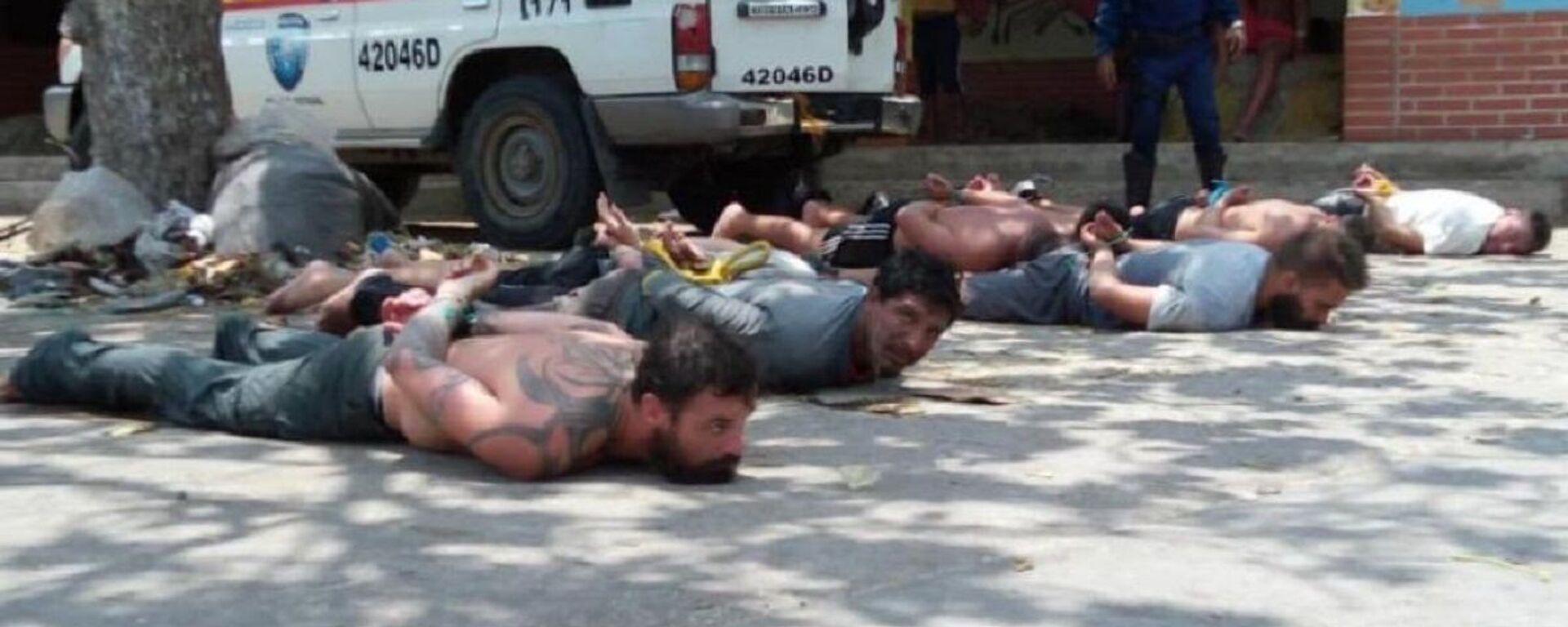https://sputnikglobe.com/20220924/mounting-pressure-on-argentine-vp-kirchner-reflects-global-political-systemic-changes-says-prof-1101183711.html
Mounting Pressure on Argentine VP Kirchner Reflects Global Political, Systemic Changes, Says Prof
Mounting Pressure on Argentine VP Kirchner Reflects Global Political, Systemic Changes, Says Prof
Sputnik International
The attempted assassination of Argentine Vice-President Cristina Fernández de Kirchner was referred to by the country's President, Alberto Fernández, for the... 24.09.2022, Sputnik International
2022-09-24T18:31+0000
2022-09-24T18:31+0000
2022-10-19T18:28+0000
analysis
us
argentina
cristina fernandez de kirchner
latin america
venezuela
brazil
brics
belt and road initiative
china
https://cdn1.img.sputnikglobe.com/img/07e6/09/02/1100290853_0:0:3243:1825_1920x0_80_0_0_0473c5720b8aa2fb058bfc8e6686c5d1.jpg
On 20 September, Argentine President Alberto Fernández started his UNGA address by condemning the shooting attempt on his deputy's life on 1 September in Recoleta, Buenos Aires. The assault has not only affected public tranquility but threatened a democratic compromise Argentina reached in 1983, Fernández said.Four suspects have been detained so far for the botched attack with investigators believing that the assault was planned. The major culprit is 35-year-old Fernando Andrés Sabag Montiel, who approached the vice-president, pointed a gun at her head, pulled the trigger twice, but the jammed gun failed to fire.The Argentine president's reference to 1983 is poignant: the nation's general election that year marked a return of constitutional rule after the military dictatorship that ruled Argentina from 1976 to 1983.Having seized power in the March 1976 coup, the military junta launched the Process of National Reorganization, also known as "the Dirty War," a campaign of state terrorism involving torture and extrajudicial murder of left-wingers and supporters of former Argentine President Juan Peron [Peronists]. It is estimated that between 10,000 and 30,000 citizens were killed; many of them simply disappearing after arrests. Democracy was restored to Argentina when Raul Alfonsin of the Radical Civic Union, a major center-left political party, won the presidential election of 1983.The attack on Kirchner recalled strong memories of the purges and prompted concerns over potential political instability in Argentina and beyond. Former Brazilian President Luiz Inacio Lula da Silva, the frontrunner to win an October election in Brazil, issued a gloomy prediction on 2 September, saying that politicians should be prepared to face a climate of violence after the botched attack.Lula da Silva's forecast comes at a time of great global political and systemic changes, notes Mele, who adds that the Brazilian politician's concerns are not unfounded given that some of his followers have been killed in the run-up to the October election. Lula da Silva’s party treasurer, Marcelo Arruda, was shot dead and another follower, 42-year old Benedito Cardoso, was murdered with an axe.Corruption TrialTo complicate matters further, the assassination attempt came during a renewed media campaign about the Argentine vice-president's alleged corruption case, the professor says.In August, the prosecutor's office indicated that it was seeking a 12-year jail sentence and a life-long ban from office for Fernández de Kirchner over an alleged criminal conspiracy during her two terms as president between 2007 and 2015 in the so-called Vialidad (“Transport”) case. The case was launched in 2019, soon after Fernández de Kirchner assumed the vice-presidency. She resolutely rejects the allegations, saying that she is a victim of political persecution by anti-Peronist groups.Fernández de Kirchner has been acquitted in several cases for alleged crimes that are supposed to have taken place when she was president, but the vice-president still faces five trials in the courts, according to the Buenos Aires Times. Speaking at the trial earlier this week Fernández de Kirchner's legal team referred to errors and contradictions in the accusation presented by the prosecution and accused the judge and prosecutors of political bias.One glaring example concerns Lula da Silva who was faced charges of alleged money laundering and corruption in 2017. However, in 2022 the Brazilian Supreme Court threw out all corruption charges against the former Brazilian president.The Intercept suggested in 2017 that the remover of Latin America's socialist governments in the 2010s through a series of "anti-corruption" trials appeared to be a coordinated effort by right-wing elements in Latin America and US conservative institutions. The latter apparently had a motive given that Latin American socialists moved away from the US-backed neo-liberal economic model and challenged US dominance at the start of the 21st century.Argentine Corporate Press is After CFKThe Argentine opposition and corporate media are capitalizing on Fernández de Kirchner's Vialidad case to smear the vice-president and the Peronist coalition ahead of the 2023 general elections, according to Mele. Earlier, Fernández de Kirchner hinted that she could throw her hat into the ring next year.The former Argentine governments of Cristina Fernández de Kirchner and her husband and predecessor Néstor Kirchner had several conflicts with major media groups, including media conglomerate Grupo Clarín, daily newspaper La Nación and weekly newspaper Perfil. CFK accused the media of deliberately promoting her overthrow. In 2008, Fernandez de Kirchner lambasted Grupo Clarín for "fomenting civil unrest" as the latter sided with farmers striking against her export taxes, according to the New York Times. The NYT also quoted Grupo Clarin critics as saying that the media group "colluded with the military dictatorship in the Seventies, giving it advantages over competitors, before aggressively expanding by pressing democratically elected leaders to loosen antimonopoly measures."Liberal center-right coalition Together for Change, which was co-founded by former Argentine President Mauricio Macri, is likely to be the beneficiary of the media's "war on Fernandez de Kirchner" as they are preparing to cross swords with the Peronist Front for Everyone coalition. Peronists lost their majority in Congress to Together for Change in November 2021.Still, Mele emphasizes, the liberal opposition does not have any new ideas to fix the economy and continues to push ahead with the economic agenda that has already failed throughout the South American continent.Apparent US Factor in Brewing TensionsAt the same time, there could also be a US factor behind the mounting pressure on the Peronist coalition, according to the professor.Washington is up in arms about Latin America's left-leaning governments strengthening relations with Russia and China, since it still sees Latin America as its backyard under the 1823 Monroe Doctrine. That said, the US leadership has plenty of reasons to be dissatisfied with Buenos Aires.The former Fernandez de Kirchner government used to maintain working relations with both Moscow and Beijing. Furthermore, her administration agreed in 2015 to permit Argentina to host a Chinese space-tracking station in the south-western province of Neuquen, which "caused consternation in the United States because of its potential for strategic uses, despite the station’s civilian designation," according to the Diplomat.Meanwhile, on 6 February 2022 the Fernandez government signed a Memorandum of Understanding (MoU) on the Belt and Road Initiative (BRI) with Beijing. In June, President Fernandez announced during the 14th BRICS summit that his country was seeking membership of BRICS, an acronym for a group of major developing economies – Brazil, Russia, India, China and South Africa.Even though Fernandez criticized Russia's military operation to demilitarize and de-Nazify Ukraine, his government has ignored the West's anti-Russian sanctions. Argentine opposition lawmakers lambasted Peronists for failing to take a "more critical stance" towards Russian President Vladimir Putin. The opposition demanded that Fernandez issue "a clear and forceful condemnation of Russia's actions", and deliver "the immediate alignment of our country with the West in the formulation of sanctions and actions aimed at restoring peace," as quoted by Buenos Aires Times.The US still maintains a strong influence on the Latin American continent, according to the professor.The United States Southern Command (USSOUTHCOM), located in Doral, Florida in Greater Miami, is responsible for "providing contingency planning, operations, and security cooperation" for Central and South America, and the Caribbean. In particular, in April 2020, the US Southern Command resorted to nothing short of a psy-op near Venezuelan shores aimed against Venezuela's President Nicolas Maduro. The show of force followed the US-backed failed the 2019 coup attempt in Caracas and preceded a botched armed incursion code-named "Operation Gideon" in May 2020 to remove the president.Regardless of growing internal and external pressure, Mele is confident that Argentina will overcome these obstacles and evade political violence at a time when the world is undergoing a profound shift in the geopolitical status quo.
https://sputnikglobe.com/20220122/a-second-pink-tide-how-argentina-brazil--chile-could-facilitate-new-south-american-union-1092453698.html
https://sputnikglobe.com/20220919/borrell-sees-ukrainian-conflict-as-good-occasion-for-enhancing-eu-latin-america-ties-1100983183.html
https://sputnikglobe.com/20220627/kremlin-on-argentinas-desire-to-join-brics-moscow-supports-organizations-expansion-1096719883.html
https://sputnikglobe.com/20200513/the-bay-of-piglets-how-botched-venezuela-raid-strips-washington-of-its-prestige--soft-power-1079292489.html
argentina
venezuela
brazil
china
Sputnik International
feedback@sputniknews.com
+74956456601
MIA „Rosiya Segodnya“
2022
News
en_EN
Sputnik International
feedback@sputniknews.com
+74956456601
MIA „Rosiya Segodnya“
Sputnik International
feedback@sputniknews.com
+74956456601
MIA „Rosiya Segodnya“
us, argentina, cristina fernandez de kirchner, latin america, venezuela, brazil, brics, belt and road initiative, china, monroe doctrine
us, argentina, cristina fernandez de kirchner, latin america, venezuela, brazil, brics, belt and road initiative, china, monroe doctrine
Mounting Pressure on Argentine VP Kirchner Reflects Global Political, Systemic Changes, Says Prof
18:31 GMT 24.09.2022 (Updated: 18:28 GMT 19.10.2022) The attempted assassination of Argentine Vice-President Cristina Fernández de Kirchner was referred to by the country's President, Alberto Fernández, for the first time on the global stage at the UN General Assembly (UNGA) this week. The Argentine leader warned against political violence.
On 20 September, Argentine President Alberto Fernández started his UNGA address by condemning the shooting attempt on his deputy's life on 1 September in Recoleta, Buenos Aires. The assault has not only affected public tranquility but threatened a democratic compromise Argentina reached in 1983, Fernández said.
"It has already been shown that it was not a lone wolf, that there were many [people] involved. But so far the investigation has focused on a group of young [hoodlums], with a vague ideological characteristic, evidently of low intellectual capacity, but dangerous, because political violence occurs gradually," Professor Carlos Pereyra Mele, director of Argentina-based think-tank Dossier Geopolitico, said. "We Argentines have a unfortunate experience of it. The problem is that justice must determine the intellectual actors and administrators of these small groups of murderers and there we can see the 'root of all evil'."
Four suspects have been detained so far for the botched attack with investigators believing that the assault was planned. The major culprit is 35-year-old Fernando Andrés Sabag Montiel, who approached the vice-president, pointed a gun at her head, pulled the trigger twice, but the jammed gun failed to fire.
The Argentine president's reference to 1983 is poignant: the nation's general election that year marked a return of constitutional rule after the military dictatorship that ruled Argentina from 1976 to 1983.
Having seized power in the March 1976 coup, the military junta launched the Process of National Reorganization, also known as "the Dirty War," a campaign of state terrorism involving torture and extrajudicial murder of left-wingers and supporters of former Argentine President Juan Peron [Peronists]. It is estimated that between 10,000 and 30,000 citizens were killed; many of them simply disappearing after arrests. Democracy was restored to Argentina when Raul Alfonsin of the Radical Civic Union, a major center-left political party, won the presidential election of 1983.
The attack on Kirchner recalled strong memories of the purges and prompted concerns over potential political instability in Argentina and beyond. Former Brazilian President Luiz Inacio Lula da Silva, the frontrunner to win an October election in Brazil, issued a gloomy prediction on 2 September, saying that politicians should be prepared to face a climate of violence after the botched attack.
Lula da Silva's forecast comes at a time of great global political and systemic changes, notes Mele, who adds that the Brazilian politician's concerns are not unfounded given that some of his followers have been killed in the run-up to the October election. Lula da Silva’s party treasurer, Marcelo Arruda, was shot dead and another follower, 42-year old Benedito Cardoso, was murdered with an axe.
To complicate matters further, the assassination attempt came during a renewed media campaign about the Argentine vice-president's alleged corruption case, the professor says.
In August, the prosecutor's office indicated that it was seeking a 12-year jail sentence and a life-long ban from office for Fernández de Kirchner over an alleged criminal conspiracy during her two terms as president between 2007 and 2015 in the so-called Vialidad (“Transport”) case. The case was launched in 2019, soon after Fernández de Kirchner assumed the vice-presidency. She resolutely rejects the allegations, saying that she is a victim of political persecution by anti-Peronist groups.
Fernández de Kirchner has been acquitted in several cases for alleged crimes that are supposed to have taken place when she was president, but the vice-president still faces five trials in the courts,
according to the Buenos Aires Times. Speaking at the trial earlier this week Fernández de Kirchner's legal team referred to errors and contradictions in the accusation presented by the prosecution and accused the judge and prosecutors of political bias.
"The crux of the matter is that corruption cases have long become a 'political tool' in Latin American countries to remove left-leaning politicians from power," remarks Mele.
One glaring example concerns Lula da Silva who was faced charges of alleged money laundering and corruption in 2017. However, in 2022 the Brazilian Supreme Court threw out all corruption charges against the former Brazilian president.
The Intercept
suggested in 2017 that the remover of Latin America's socialist governments in the 2010s through a series of "anti-corruption" trials appeared to be a coordinated effort by right-wing elements in Latin America and US conservative institutions. The latter apparently had a motive given that Latin American socialists moved away from the US-backed neo-liberal economic model and challenged US dominance at the start of the 21st century.
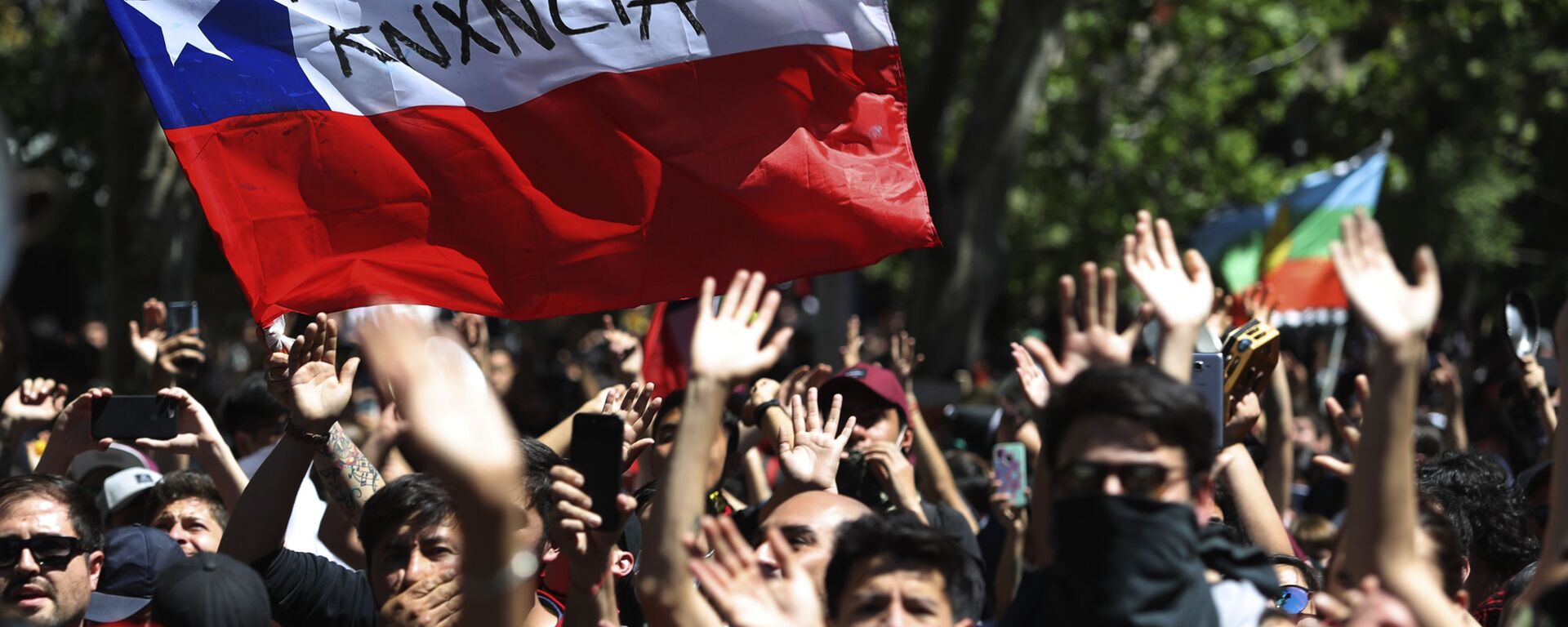
22 January 2022, 21:19 GMT
Argentine Corporate Press is After CFK
The Argentine opposition and corporate media are capitalizing on Fernández de Kirchner's Vialidad case to smear the vice-president and the Peronist coalition ahead of the 2023 general elections, according to Mele. Earlier, Fernández de Kirchner hinted that she could throw her hat into the ring next year.
"The press monopoly is actually the one that has dictated the 'political agenda' for 40 years," says the professor. "Two media groups have monopolized all journalistic spectrums: newspapers, radios, internet television and cable television. (Despite declaring themselves liberals, they behave as though they are oligopolies and they face very little opposition.) What gives them disproportionate power when it comes to imposing an 'agenda' is that journalists publicly declared war against the government of Fernandez de Kirchner. They never let up on their attacks against CFK and now they have redoubled their efforts."
The former Argentine governments of Cristina Fernández de Kirchner and her husband and predecessor Néstor Kirchner had several conflicts with major media groups, including media conglomerate Grupo Clarín, daily newspaper La Nación and weekly newspaper Perfil. CFK accused the media of deliberately promoting her overthrow. In 2008, Fernandez de Kirchner lambasted Grupo Clarín for "fomenting civil unrest" as the latter sided with farmers striking against her export taxes,
according to the New York Times. The NYT also quoted Grupo Clarin critics as saying that the media group "colluded with the military dictatorship in the Seventies, giving it advantages over competitors, before aggressively expanding by pressing democratically elected leaders to loosen antimonopoly measures."
Liberal center-right coalition Together for Change, which was co-founded by former Argentine President Mauricio Macri, is likely to be the beneficiary of the media's "war on Fernandez de Kirchner" as they are preparing to cross swords with the Peronist Front for Everyone coalition. Peronists lost their majority in Congress to Together for Change in November 2021.
Still, Mele emphasizes, the liberal opposition does not have any new ideas to fix the economy and continues to push ahead with the economic agenda that has already failed throughout the South American continent.
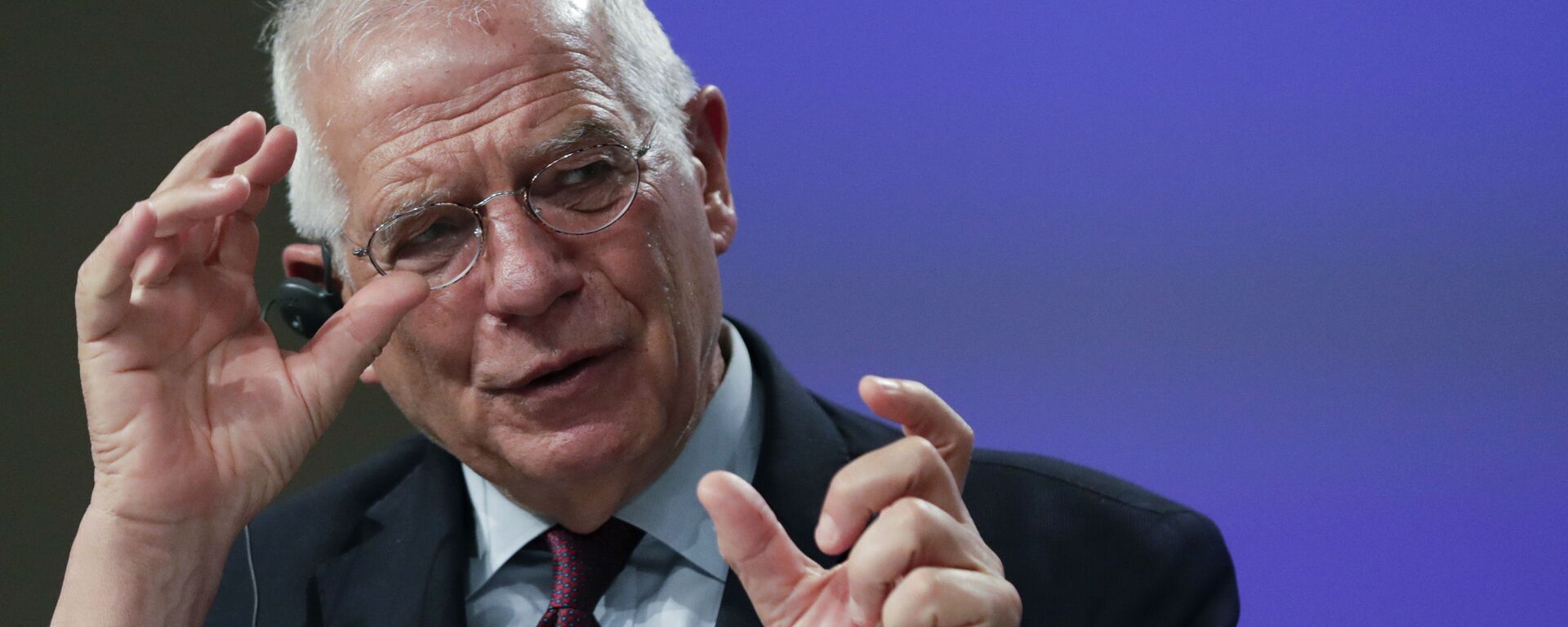
19 September 2022, 21:00 GMT
Apparent US Factor in Brewing Tensions
At the same time, there could also be a US factor behind the mounting pressure on the Peronist coalition, according to the professor.
Washington is up in arms about Latin America's left-leaning governments strengthening relations with Russia and China, since it still sees Latin America as its backyard under the 1823 Monroe Doctrine. That said, the US leadership has plenty of reasons to be dissatisfied with Buenos Aires.
The former Fernandez de Kirchner government used to maintain working relations with both Moscow and Beijing. Furthermore, her administration agreed in 2015 to permit Argentina to host a Chinese space-tracking station in the south-western province of Neuquen, which "caused consternation in the United States because of its potential for strategic uses, despite the station’s civilian designation,"
according to the Diplomat.
Meanwhile, on 6 February 2022 the Fernandez government signed a Memorandum of Understanding (MoU) on the Belt and Road Initiative (BRI) with Beijing. In June, President Fernandez announced during the 14th BRICS summit that his country was seeking membership of BRICS, an acronym for a group of major developing economies – Brazil, Russia, India, China and South Africa.
Even though Fernandez criticized Russia's military operation to demilitarize and de-Nazify Ukraine, his government has ignored the West's anti-Russian sanctions. Argentine opposition lawmakers lambasted Peronists for failing to take a "more critical stance" towards Russian President Vladimir Putin. The opposition
demanded that Fernandez issue "a clear and forceful condemnation of Russia's actions", and deliver "the immediate alignment of our country with the West in the formulation of sanctions and actions aimed at restoring peace," as quoted by Buenos Aires Times.
The US still maintains a strong influence on the Latin American continent, according to the professor.
"On the other hand, the pressure exerted by the US deep state through its military command system (in our case the 'Southern Command') is also always present (…) which is another source of conflict and intervention in our foreign policy decisions that should be sovereign and which continually creates friction with the northern power," Mele says.
The United States Southern Command (USSOUTHCOM), located in Doral, Florida in Greater Miami, is responsible for "providing contingency planning, operations, and security cooperation" for Central and South America, and the Caribbean. In particular, in April 2020, the US Southern Command
resorted to nothing short of a psy-op near Venezuelan shores aimed against Venezuela's President Nicolas Maduro. The show of force followed the US-backed failed the 2019 coup attempt in Caracas and preceded a
botched armed incursion code-named "Operation Gideon" in May 2020 to remove the president.
Regardless of growing internal and external pressure, Mele is confident that Argentina will overcome these obstacles and evade political violence at a time when the world is undergoing a profound shift in the geopolitical status quo.
